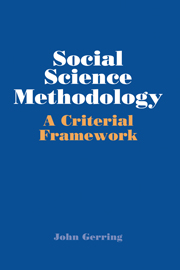Book contents
8 - Research Design: General Criteria
Published online by Cambridge University Press: 05 June 2012
Summary
But is it True?
–Aaron WildavskySocial science methodology, I have argued, may be usefully divided into three broad tasks, concepts, propositions, and research design, corresponding to the three parts of the book. Concepts nest within propositions, since propositions must be stated with key concepts. And propositions nest within research designs, since all propositions must be demonstrated in some fashion.
Research design refers here to any investigation of the empirical world that bears upon a proposition's truth-value – its degree of truth or probability of truth, which we called accuracy in Chapter 4. How do we know that a given proposition is true or false? How will we go about demonstrating (i.e., verifying, falsifying, proving) its truth? These are the central questions of research design.
This chapter explores general criteria pertaining to all research designs. Chapter 9 discusses a variety of methods by which writers attempt to maximize these desiderata. Chapter 10 sets forth two polar strategies that all research designs navigate between – confirmatory and exploratory.
Since causal relationships are the most complicated sort, at least from a methodological point of view, these chapters focus primarily on research design in causal inference. Of course, causal analysis rests on descriptive analysis. We must be able to identify an X and a Y in order to determine their relationship. At a basic level, descriptive and causal analysis are inextricably linked, as we have emphasized (Chapter 6).
- Type
- Chapter
- Information
- Social Science MethodologyA Criterial Framework, pp. 155 - 199Publisher: Cambridge University PressPrint publication year: 2001



